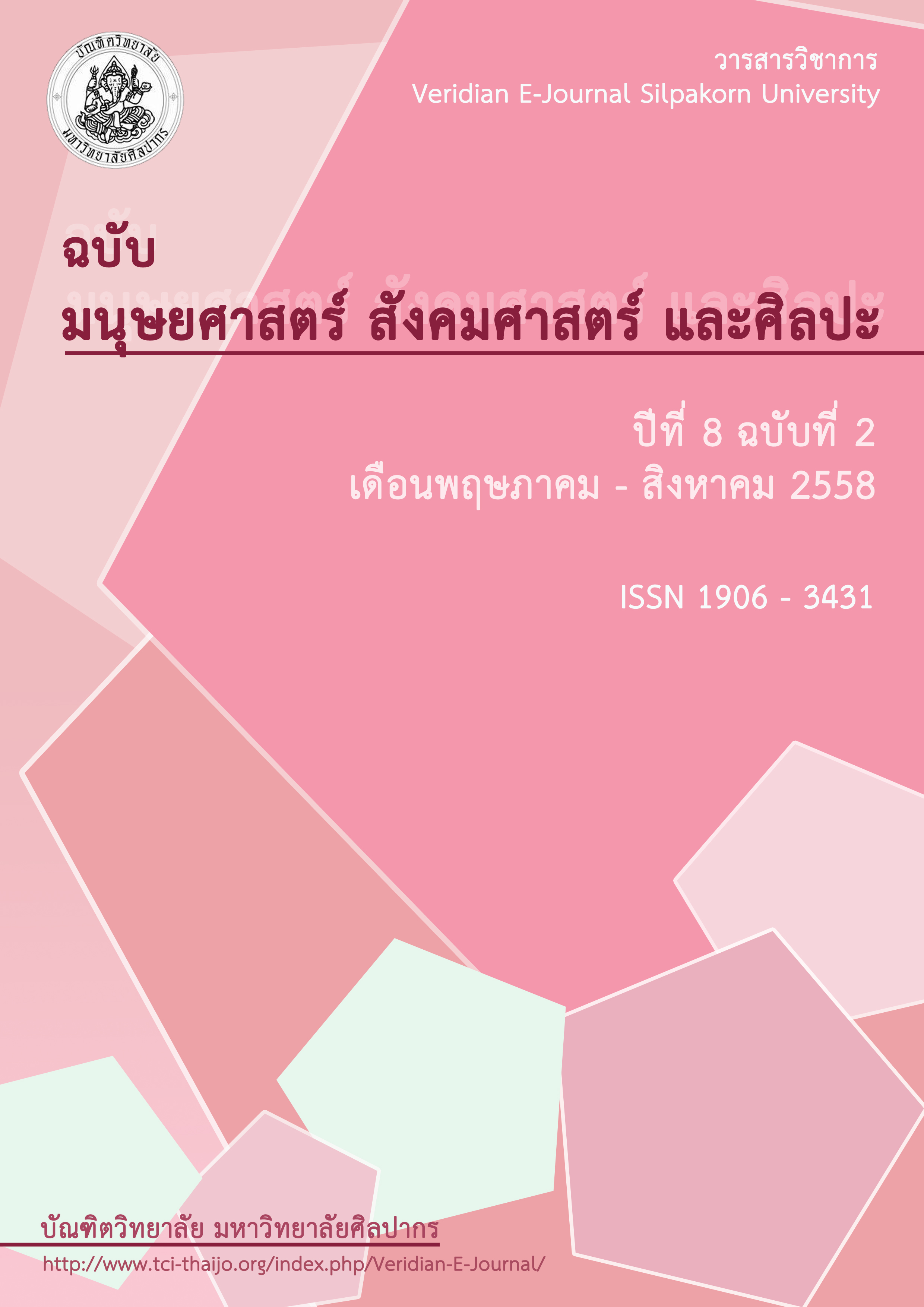ผลการจัดกิจกรรมการเรียนรู้แบบอุปนัยที่มีต่อมโนทัศน์ทางคณิตศาสตร์และความสามารถในการให้เหตุผลทางคณิตศาสตร์ ของนักเรียนชั้นมัธยมศึกษาปีที่ 4
Main Article Content
Abstract
บทคัดย่อ
การวิจัยครั้งนี้มีวัตถุประสงค์เพื่อเปรียบเทียบมโนทัศน์ทางคณิตศาสตร์ และความสามารถในการให้เหตุผลทางคณิตศาสตร์ เรื่อง ความสัมพันธ์ ของนักเรียนชั้นมัธยมศึกษาปีที่ 4 หลังเรียนด้วยกิจกรรมการเรียนรู้แบบอุปนัย กับเกณฑ์ร้อยละ 70 ซึ่งเป็นแผนการวิจัยแบบ ศึกษากลุ่มเดียววัดหลังการทดลองครั้งเดียว (one-group posttest-only design) กลุ่มตัวอย่างที่ใช้ในการวิจัยครั้งนี้ได้แก่ นักเรียนชั้นมัธยมศึกษาปีที่ 4/3 ภาคเรียนที่ 2 ปีการศึกษา 2558 โรงเรียนเบญจมราชรังสฤษฎ์ จังหวัดฉะเชิงเทรา จำนวน 47 คนซึ่งได้มาจากการสุ่มตัวอย่างแบบกลุ่ม โดยใช้เวลาในการทำวิจัยจำนวน 14 คาบ คาบละ 50 นาที โดยดำเนินการสอน 12 คาบ และเป็นการทดสอบ 2 คาบ เครื่องมือที่ใช้ในการวิจัยได้แก่ แผนการจัดกิจกรรมการเรียนรู้แบบอุปนัย จำนวน 7 แผน แบบวัดมโนทัศน์ทางคณิตศาสตร์ เรื่อง ความสัมพันธ์ มีค่าความเชื่อมั่น 0.716 และแบบวัดความสามารถในการให้เหตุผลทางคณิตศาสตร์ที่มีค่าความเชื่อมั่น 0.801 วิเคราะห์ผลด้วยสถิติ t-test แบบ one sample
ผลการวิจัยสรุปได้ดังนี้
1. มโนทัศน์ทางคณิตศาสตร์ เรื่อง ความสัมพันธ์ ของนักเรียนชั้นมัธยมศึกษาปีที่ 4 หลังเรียนด้วยกิจกรรมการเรียนรู้แบบอุปนัย สูงกว่าเกณฑ์ร้อยละ 70 อย่างมีนัยสำคัญที่ระดับ .05
2. ความสามารถในการให้เหตุผลทางคณิตศาสตร์ของนักเรียนชั้นมัธยมศึกษาปีที่ 4 หลังเรียนด้วยกิจกรรมการเรียนรู้แบบอุปนัย สูงกว่าเกณฑ์ร้อยละ 70 อย่างมีนัยสำคัญที่ระดับ .05
คำสำคัญ: กิจกรรมการเรียนรู้แบบอุปนัย/ มโนทัศน์ทางคณิตศาสตร์/ ความสามารถในการให้เหตุผลทาง
คณิตศาสตร์/ ความสัมพันธ์
Abstract
The purposes of this research were to compare the student’s mathematical concepts of relation and mathematical reasoning ability of Mathayomsuksa VI after using Instructional inductive model. The design of research is one-group posttest-only design. The subjects of this study were 47 Mathayomsuksa IV students in the second semester of the 2014 academic year at Benchamaracharungsarit School, Chacheongsoa. They were randomly selected by using cluster random sampling. The experiment lasted for 14 periods, which each period is 50 minute, separate to teaching 12 periods and for posttest 2 periods. The instruments used in study were the 7 lesson plans, mathematical concepts of relation test with reliability of 0.716 and mathematical reasoning ability test with reliability of 0.801. The data were statistically analyzed by using t-test for one sample.
The findings were as follows:
1. The mathematical concepts of relation of sample group after obtainiInstructional inductive model was statistically high than 70 percent criterion at the .05 level of significance.
2. The mathematical reasoning ability of sample group after obtaining Instructional inductive model was statistically high than 70 percent criterion at the .05 level of significance.
Keywords: Inductive learning activity/ Mathematical concepts /Mathematical reasoning ability/ Relation

